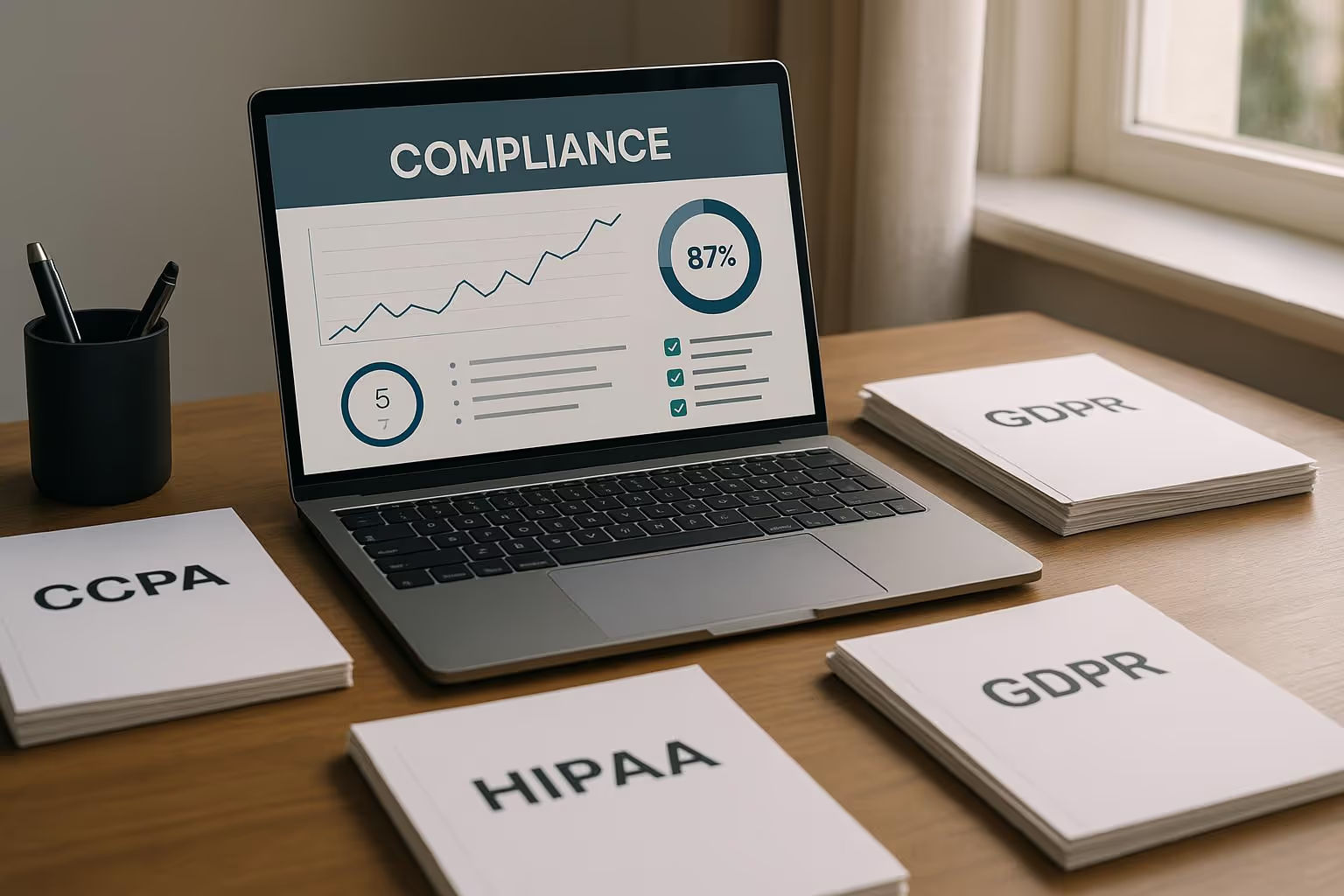
AI compliance platforms are essential for businesses integrating artificial intelligence into operations while navigating complex regulations like CCPA, HIPAA, and GDPR. These tools streamline compliance by automating tasks, managing risks, and ensuring transparency. Here’s a quick look at five leading platforms:
These platforms address critical challenges like data privacy, audit readiness, and governance. Businesses should evaluate their specific needs - whether scalability, cost efficiency, or regulatory coverage - to choose the right solution.
| Platform | Strengths | Challenges |
|---|---|---|
| Prompts.ai | AI model support, cost control, governance | Bias detection needs improvement |
| Scrut | Multi-framework support, automation | Limited AI transparency features |
| Sprinto | Workflow automation, integrations | AI data privacy at scale |
| Vanta | Real-time monitoring, continuous testing | Limited human oversight for AI outputs |
| Drata | Custom frameworks, streamlined audits | Keeping pace with AI-specific regulations |
Selecting the right platform depends on balancing compliance needs with operational goals.
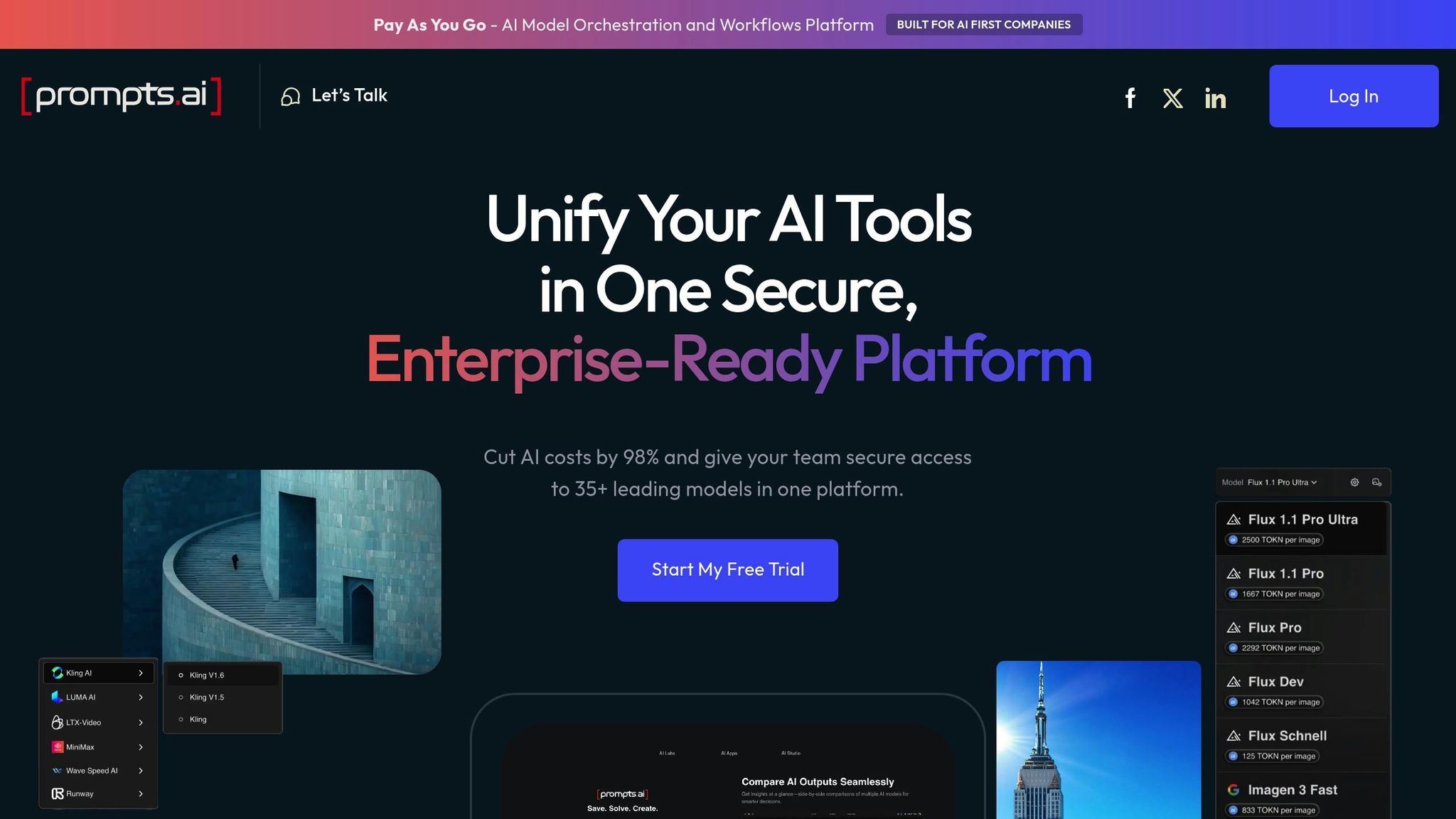
Prompts.ai is designed as an enterprise-level AI orchestration platform, embedding compliance seamlessly into every aspect of AI workflows. With governance controls integrated into a single interface, the platform supports over 35 leading AI models, such as GPT-5, Claude, LLaMA, and Gemini. This setup ensures rigorous regulatory adherence and offers robust tools for managing AI processes at scale.
The platform emphasizes full lifecycle governance, tracking AI systems from their development stages through to decommissioning. This approach ensures organizations remain aligned with regulatory requirements while efficiently managing large-scale AI deployments.
Prompts.ai is built to meet the demands of major U.S. and international regulatory frameworks. It provides pre-configured templates and workflows that align AI operations with standards like CCPA, HIPAA, SOC 2, and NIST. It also addresses emerging regulations, such as the EU AI Act and FTC AI guidelines, as well as industry-specific rules. On June 19, 2025, Prompts.ai advanced its security compliance initiatives by initiating its SOC 2 Type 2 audit process and partnering with Vanta for continuous monitoring. This partnership ensures alignment with SOC 2 Type II, HIPAA, and GDPR best practices.
Prompts.ai enhances compliance management through AI-driven automation, streamlining complex processes. Key features include automated evidence collection, policy creation, and real-time monitoring. The platform also offers capabilities like data mapping, compliance dashboards, and integrations with cloud services to automatically gather compliance evidence. These tools significantly reduce the need for manual documentation, enabling organizations to transition from ad-hoc compliance efforts to scalable, 24/7 processes.
For example, a healthcare provider using Prompts.ai reduced compliance preparation time by 40% and successfully passed a third-party audit with minimal manual intervention.
Prompts.ai ensures transparency by centralizing documentation and automatically generating detailed audit trails. These trails track changes, decisions, and updates throughout the AI lifecycle. Features like version control and customizable dashboards provide real-time insights into compliance status, risk assessments, and audit readiness. The platform uses U.S. date formats (MM/DD/YYYY) and currency symbols ($), offering a clear and standardized view of governance and security metrics.
The platform prioritizes data privacy and security with robust measures, including encryption for data at rest and in transit, role-based access controls, privacy-by-design workflows, and automated data minimization and anonymization.
"Prompts.ai incorporates best practices from SOC 2 Type II, HIPAA, and GDPR frameworks to safeguard your data." - prompts.ai
Users can monitor their organization’s security posture through a dedicated Trust Center, which provides real-time updates on policies, controls, and compliance progress.
Prompts.ai includes tools to address fairness concerns by detecting and mitigating bias in AI model outputs. Bias detection modules analyze outputs for disparate impacts across demographic groups, while dashboards display bias metrics and issue automated alerts for potential problems. The platform also offers actionable recommendations for retraining or adjusting models. By embedding these tools directly into workflows, organizations can proactively address fairness issues before they affect end users.
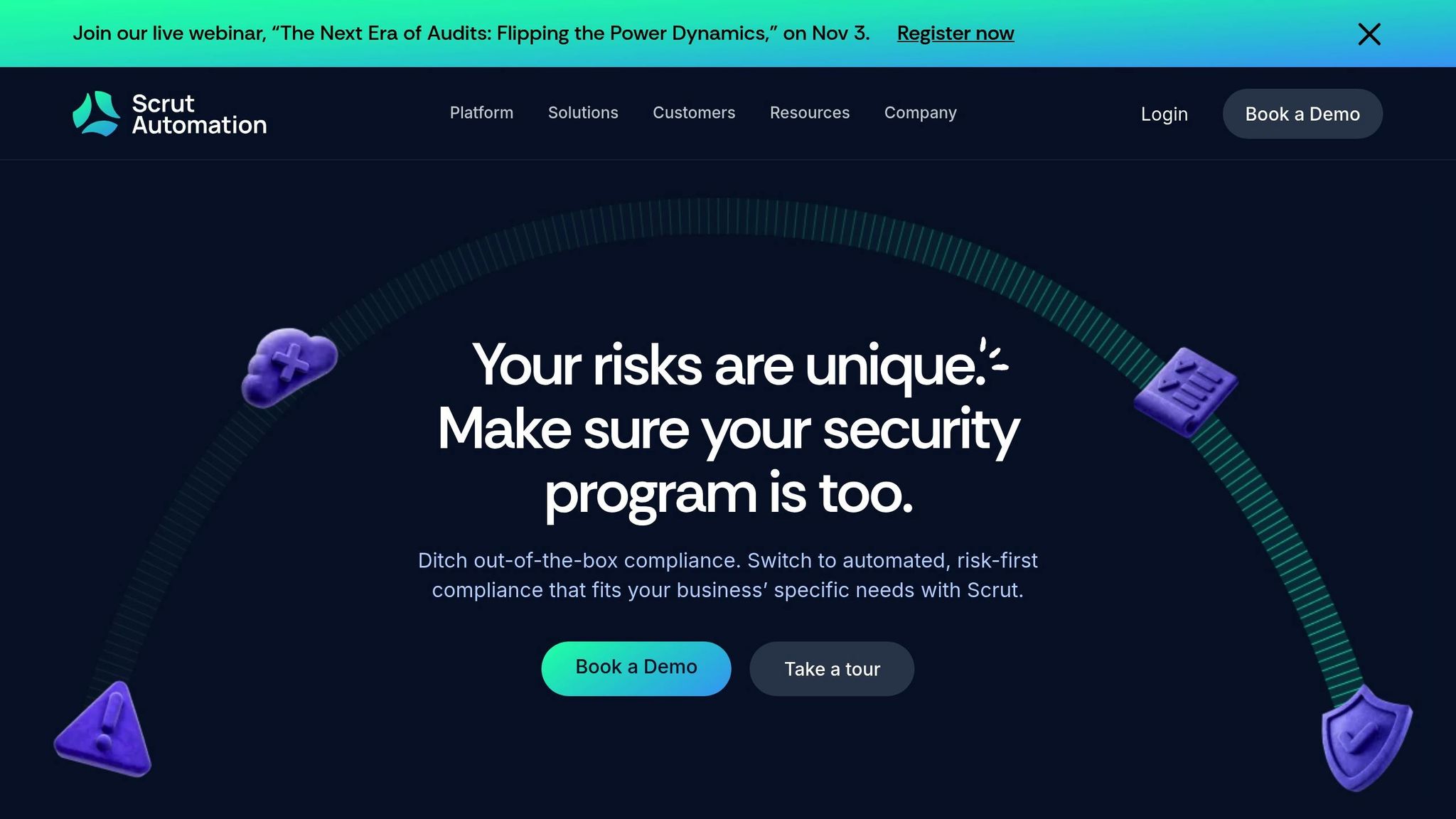
Scrut is a governance, risk, and compliance (GRC) platform designed to simplify regulatory compliance and provide continuous monitoring. Its automated processes aim to make regulatory adherence more efficient and manageable.
Scrut provides a variety of regulatory templates and pre-built control frameworks, helping organizations handle multiple compliance requirements in one place. This unified approach reduces the challenges of meeting diverse standards and ensures a structured compliance process.
By automating key tasks, Scrut minimizes the reliance on manual processes. It streamlines evidence collection, conducts risk assessments, and identifies control gaps while generating alerts when necessary. Continuous monitoring allows organizations to stay ahead, adopting a proactive stance toward compliance.
Scrut enhances clarity with detailed audit trails and an intuitive dashboard that offers real-time updates on compliance status. Centralized documentation and automated reporting make audit preparation smoother, enabling quick responses to compliance-related inquiries.
To protect sensitive information, Scrut employs encryption and role-based access controls. These measures ensure that compliance data is handled securely while meeting regulatory standards for data protection.
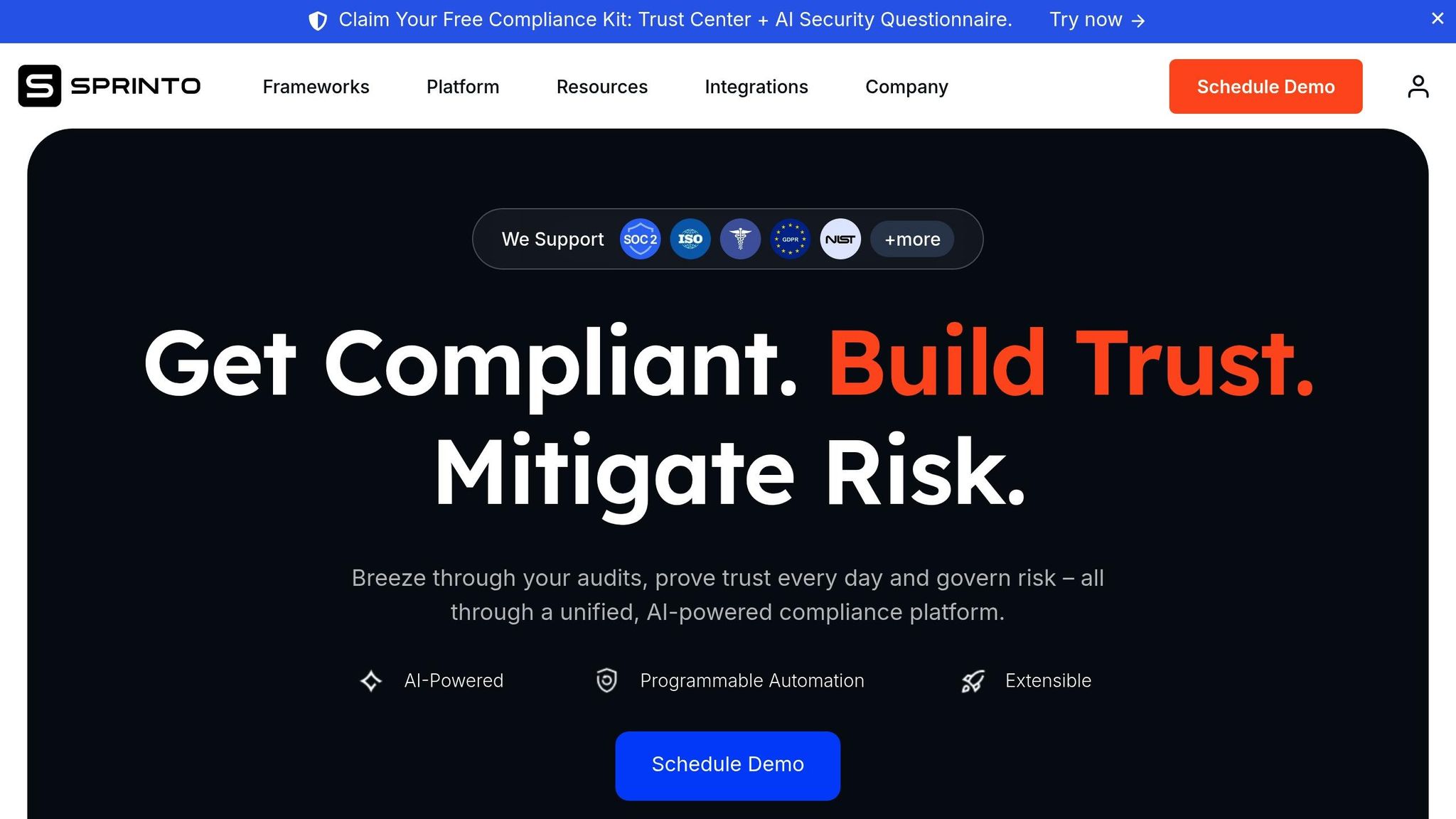
Sprinto is a compliance automation platform designed to simplify security and privacy certifications. By automating manual compliance tasks and providing a clear overview of progress, it helps organizations maintain control and efficiency.
Sprinto supports a wide range of compliance frameworks, including SOC 2, ISO 27001, GDPR, and HIPAA. With pre-built control templates tailored to each framework, it allows businesses to manage various regulatory requirements from a single platform. This unified approach reduces the need to duplicate efforts across different standards, making compliance management more efficient.
The platform's framework mapping feature identifies overlapping controls across multiple standards. This means companies can reuse existing compliance work when pursuing additional certifications, saving time and resources. This capability is especially useful for businesses operating in multiple regions or serving clients with diverse regulatory needs, as it simplifies the process of adhering to complex compliance obligations.
Sprinto integrates directly with popular tools like AWS, Google Workspace, Slack, and GitHub to automate evidence collection. These integrations eliminate the need for manual data gathering, streamlining routine compliance tasks while ensuring accurate and consistent documentation.
Additionally, Sprinto continuously monitors the effectiveness of compliance controls, sending alerts when issues arise and guiding teams through remediation with automated workflows. This proactive approach helps businesses maintain their compliance readiness between formal audits, reducing the risk of lapses.
Sprinto provides detailed audit trails, documenting every compliance activity - such as when controls were tested, who performed the testing, and the evidence collected. Its dashboard offers real-time insights into compliance progress across all frameworks, highlighting completion rates and areas needing attention.
The platform also simplifies audit preparation with automated reporting tools. These tools generate reports tailored to specific frameworks, organizing evidence in a way that meets auditor expectations. This structured documentation allows businesses to quickly respond to auditor requests and regulatory inquiries, ensuring a smoother audit process.
In addition to its compliance features, Sprinto prioritizes data protection. It uses encryption at rest and in transit to safeguard sensitive information and enforces role-based access controls to limit data access to authorized team members. Multi-factor authentication further secures user accounts.
Sprinto's own SOC 2 Type II certification reflects its strong commitment to security. The platform also offers data residency options, giving organizations control over where their compliance data is stored, which is critical for meeting specific regulatory requirements around data sovereignty.
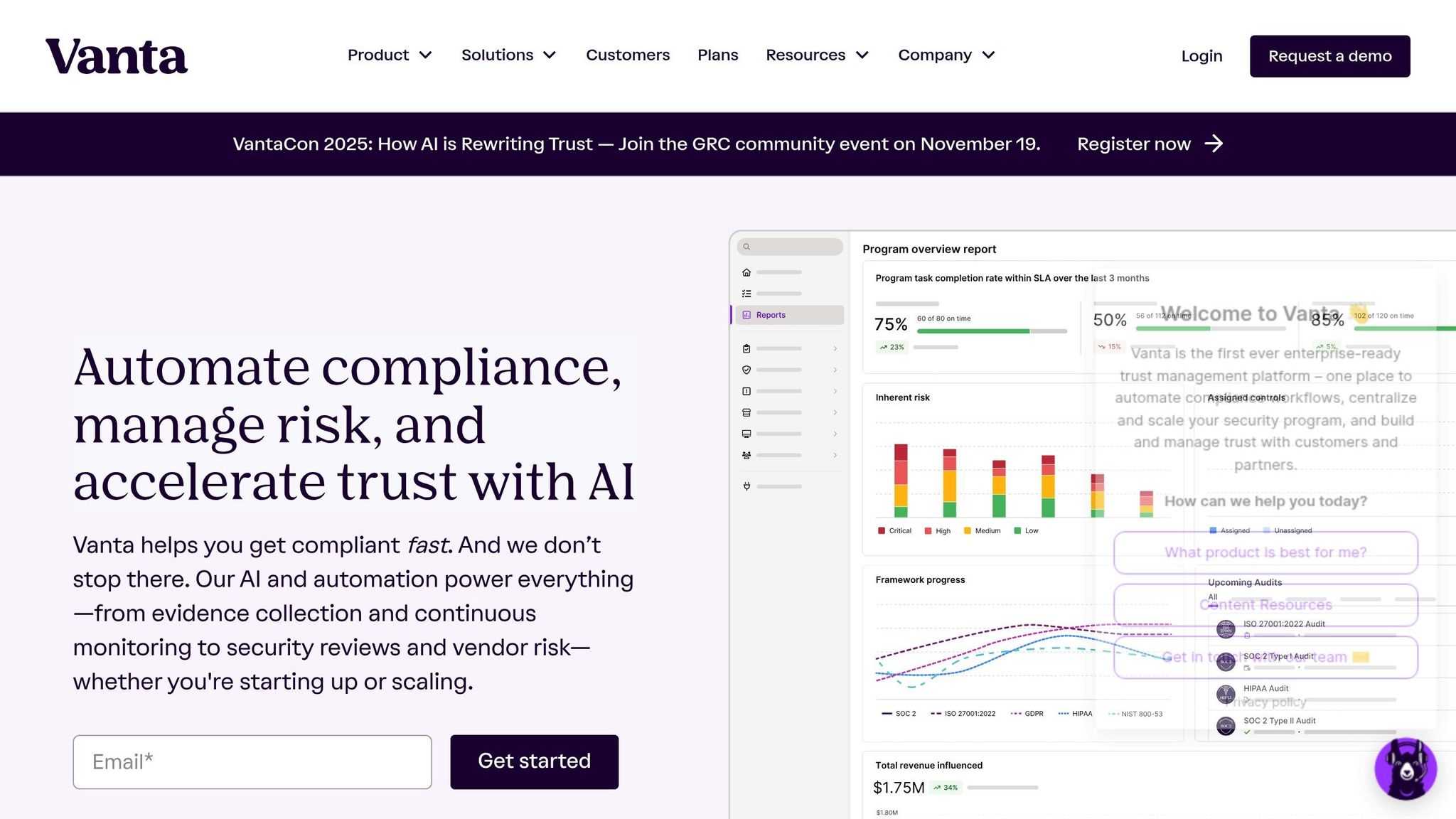
Vanta is a platform designed to simplify security and compliance processes by automating certifications and reducing the need for manual work through continuous monitoring.
Vanta supports a variety of compliance frameworks such as SOC 2, ISO 27001, PCI DSS, HIPAA, and GDPR, offering pre-built control libraries for each. These libraries help organizations quickly establish baseline security measures without starting from scratch.
What sets Vanta apart is its ability to map shared requirements across multiple frameworks. For companies aiming for multiple certifications, Vanta identifies overlapping requirements, allowing teams to reuse compliance efforts. For example, many controls needed for SOC 2 Type II also align with ISO 27001, and Vanta automatically recognizes these overlaps to save time and effort.
For organizations with unique regulatory needs, Vanta also supports custom frameworks. This feature is particularly helpful for businesses in specialized fields or those with specific contractual obligations that go beyond standard frameworks. These tools lay the foundation for Vanta's advanced automation capabilities.
Vanta integrates with over 300 widely-used business tools, including AWS, Google Cloud Platform, Microsoft Azure, Okta, GitHub, and Slack, to automate evidence collection and reduce manual documentation efforts.
The platform’s continuous monitoring tracks security configurations in real time. If an issue arises, such as unauthorized access or misconfigured settings, Vanta immediately alerts the team and provides guidance for resolving the problem.
Its automated testing regularly checks that security controls are functioning properly. This includes verifying password policies, ensuring backup procedures are in place, and confirming timely access reviews. These ongoing checks help maintain compliance between audits, ensuring that nothing slips through the cracks.
Vanta provides a detailed audit trail and a real-time dashboard that delivers clear insights into compliance status. The dashboard highlights completed controls, pending tasks, and gaps, helping teams focus on what matters most.
When it’s time for an audit, Vanta generates audit-ready reports tailored to each framework's requirements. These reports include all the necessary evidence, test results, and documentation in auditor-friendly formats, significantly cutting down on the time and effort required for formal assessments.
Vanta takes data security seriously, using AES-256 encryption for data at rest and TLS 1.2+ for data in transit. All data is processed in secure, SOC 2-certified facilities.
The platform employs role-based access controls to ensure only authorized personnel can access sensitive compliance information. Additionally, Vanta offers data residency options, allowing organizations to choose where their compliance data is stored and processed. This feature helps businesses meet local data sovereignty requirements and manage cross-border data obligations.
To further ensure trust, Vanta itself holds a SOC 2 Type II certification and undergoes regular third-party security assessments. These measures provide an added layer of confidence for organizations relying on Vanta to handle their compliance data securely.
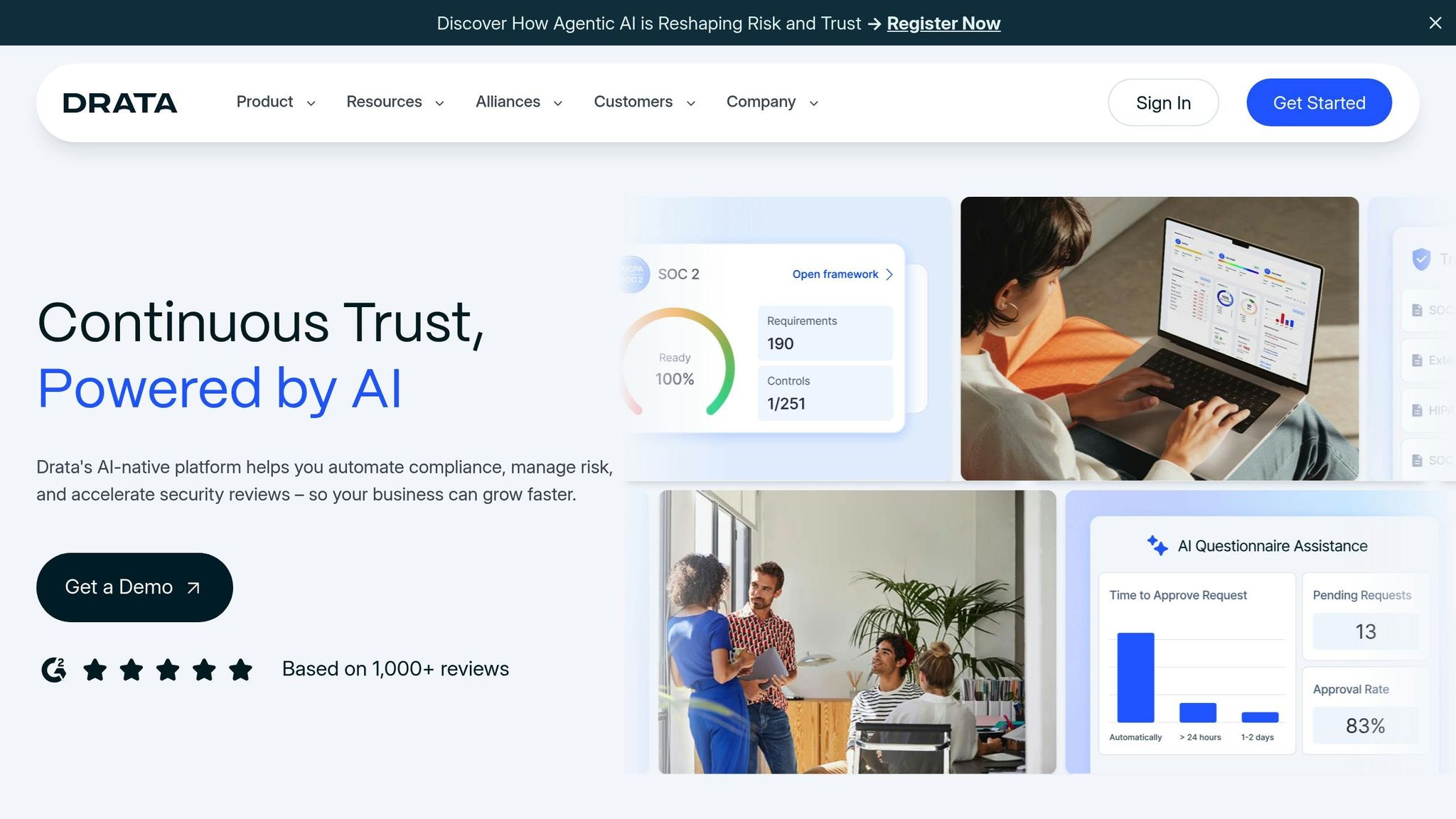
Drata stands out as a platform focused on simplifying compliance processes by reducing manual tasks. With unified monitoring and automated evidence management, it offers organizations an efficient way to maintain security certifications while minimizing administrative overhead.
Drata supports a wide range of compliance frameworks, including SOC 2, ISO 27001, PCI DSS, HIPAA, and GDPR. It comes equipped with pre-configured controls for each framework, allowing organizations to quickly implement compliance measures.
The platform also features framework mapping tools that identify overlapping requirements across multiple certifications, helping streamline efforts for companies pursuing multiple credentials.
For businesses with unique compliance demands, Drata provides custom framework support. This feature enables organizations to design tailored control sets that address specific industry regulations or client requirements. This flexibility is particularly useful for companies in heavily regulated industries or those with specialized security standards.
Drata integrates with over 75 widely used business applications, including cloud platforms like AWS, Google Cloud, and Microsoft Azure, as well as identity management tools such as Okta and OneLogin. These integrations allow the platform to automate evidence collection by pulling data directly from existing systems.
The platform's continuous monitoring ensures real-time tracking of security configurations across connected systems. If a deviation from established policies is detected, Drata flags the issue immediately and provides guidance for remediation. This proactive approach helps organizations maintain their compliance posture between audit cycles.
Automated testing further enhances compliance by running regular checks on critical security controls. These tests verify the enforcement of access management policies, the functionality of backup procedures, and the integrity of security configurations. The results generate evidence trails that auditors can easily review, significantly reducing the time spent preparing for formal assessments.
Drata simplifies audit preparation with a centralized dashboard that provides a real-time view of compliance status. The dashboard highlights completed controls, pending tasks, and generates audit-ready documentation that compiles evidence, test results, and control assessments into formats auditors can easily navigate.
Its evidence management system organizes all compliance data, making it simple to search and retrieve specific items. This ensures teams can quickly demonstrate control effectiveness and respond to auditor requests without unnecessary delays.
Drata employs robust security measures to protect compliance data, adhering to industry best practices. It uses AES-256 encryption for data storage and TLS 1.3 for secure data transmission.
Role-based access controls ensure that only authorized personnel can access sensitive compliance data. Organizations can set detailed permissions to align with their internal security policies, restricting access to audit materials to relevant team members.
The platform also offers data residency options, allowing businesses to choose where their compliance data is stored and processed. This feature is particularly beneficial for organizations managing cross-border data transfers or operating in multiple jurisdictions with varying data protection laws, helping them meet data sovereignty requirements with confidence.
This section provides a concise comparison of each platform's main advantages and challenges, helping organizations align their choice with specific regulatory and operational needs. While every platform offers distinct benefits, they also come with limitations that must be carefully considered.
Prompts.ai excels in cost management by supporting a variety of models through a unified, pay-as-you-go system. With access to over 35 leading language models and tools for real-time spending control, it simplifies AI operations significantly. However, its bias detection capabilities require further development. Since AI algorithms can inherit biases from training data, improving monitoring systems is critical for ensuring fairness in sensitive areas like hiring and loan decisions.
Scrut shines with its ability to support multiple frameworks and automate evidence collection, making it a strong choice for organizations pursuing several certifications at once. However, its focus on traditional security frameworks limits its ability to address transparency and explainability issues that are increasingly important in AI systems.
Sprinto is known for its user-friendly interface and workflow automation, which streamline compliance processes and reduce complexity. Its task management tools are particularly effective for meeting compliance requirements. On the downside, Sprinto may encounter difficulties in managing data privacy and security at the scale required for AI systems, where vast datasets increase the risk of breaches and unauthorized access.
Vanta offers robust real-time monitoring and seamless integration with popular business tools, simplifying the process of maintaining continuous compliance. Automated control testing ensures ongoing assurance between audits. However, the platform needs to enhance its mechanisms for human oversight to address accountability issues when AI outputs fall short.
Drata is highly regarded for its administrative efficiency and support for custom frameworks, which reduce manual compliance efforts and streamline audit preparations. That said, it must keep pace with the rapidly changing legal and regulatory environment surrounding AI to ensure its controls remain relevant.
| Platform | Key Strengths | Primary Challenges |
|---|---|---|
| Prompts.ai | Cost efficiency, 35+ AI models, real-time spending controls, unified interface | Needs stronger bias detection capabilities |
| Scrut | Multi-framework support, automated evidence collection | Limited focus on transparency and explainability in AI systems |
| Sprinto | Workflow automation, intuitive interface, simplified compliance processes | Challenges with large-scale AI data privacy and security |
| Vanta | Real-time monitoring, extensive integrations, automated control testing | Gaps in accountability and human oversight |
| Drata | Administrative efficiency, custom frameworks, streamlined audit preparation | Adapting to evolving AI regulations |
This comparison underscores the critical factors organizations should evaluate when choosing an AI compliance platform. Success depends on how well a platform addresses key issues like bias mitigation, data security, transparency, and accountability. Companies should focus on solutions that align with their specific needs while excelling in these essential areas.
Selecting the right AI compliance platform requires a clear understanding of your organization's compliance requirements and operational scale. Among the options reviewed, Prompts.ai emerges as a standout choice for enterprises aiming to access cutting-edge AI models while ensuring strong governance practices. This evaluation highlights why Prompts.ai excels at balancing cost management, compliance, and access to advanced AI capabilities.
With its TOKN-based, pay-as-you-go model, Prompts.ai eliminates recurring subscription fees, offering the potential to reduce AI software costs by up to 98%. The platform’s real-time FinOps tools provide immediate insights into token usage and spending, enabling businesses to directly connect AI investments to measurable outcomes.
As regulatory landscapes continue to evolve, the need for adaptable solutions grows. Prompts.ai meets this demand with cost-effective operations, robust security measures, and an engaged prompt engineering community. Its unified platform reduces tool sprawl and ensures the transparency and governance required for responsible AI implementation.
Additionally, the Prompt Engineer Certification program and expert-designed workflows help organizations build internal expertise and embed best practices across teams. For enterprises scaling AI under stringent compliance requirements, Prompts.ai offers a well-rounded solution that combines cost efficiency, strong security, and streamlined operations.
Prompts.ai makes navigating complex regulations like GDPR and HIPAA easier by providing tools tailored to tackle challenges such as data privacy, transparency, and bias reduction. These features help ensure your AI systems remain within legal and ethical guidelines, minimizing the risk of compliance issues.
By using Prompts.ai, businesses can simplify their compliance workflows, keep a close eye on AI operations to meet regulatory standards, and access actionable insights that build trust and maintain accountability in their AI initiatives.
Prompts.ai prioritizes data privacy and security, ensuring organizations can meet regulatory standards with confidence. By utilizing advanced encryption techniques, the platform protects sensitive data both during storage and transmission, keeping your information secure at all times.
The platform also offers strong access controls, enabling businesses to efficiently manage user permissions and block unauthorized access. With adherence to stringent privacy policies and built-in support for compliance with frameworks such as GDPR and CCPA, Prompts.ai provides a dependable solution for deploying AI securely.
Prompts.ai takes on the challenge of bias in AI models with tools that are built to spot, assess, and address bias at every stage of the AI development process. These tools dive into datasets and algorithms, uncovering potential sources of bias to ensure models are both fair and ethical.
The platform goes a step further by offering practical recommendations to enhance model transparency and fairness. This helps organizations stay compliant with regulatory standards and adhere to ethical practices. By tackling bias early, Prompts.ai empowers businesses to create reliable AI systems that produce fair and balanced results.


